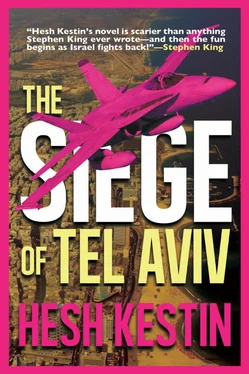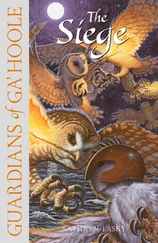“Exactly,” Marshall al-Asadi says. “We have a proverb: a Jew lives, the problem grows.”
“So it is agreed?” General Niroomad asks. It is rhetorical, a gesture.
“Syria votes yes.”
“The Kingdom of Jordan agrees. As per plan, the Hashemite tanks will have the honor to be the first to enter Tel Aviv.”
“Allah go with them,” Field Marshal Haloumi says. “Egyptian infantry will follow. The streets will run with blood.”
“Our Syrian heroes will seal the city,” General al-Asadi confirms. “None will flee. Not an infant. Neither a Jewish cat nor a Jewish dog.”
Field Marshal Haloumi turns to the Russian. “The Americans, will they not come to the aid of the Jews? Will they not send the Sixth Fleet?”
“The wings of the American eagle are soaked in oil,” Tupikov says. “It is a dodo, a flightless bird. Our satellites display no action, no movement, not even a breeze. The Americans don’t care for the Jews, neither for the Palestinians. They care only for oil.”
“Again the Palestinians,” General Said says. “Squash one bug, up comes another.”
Tupikov shakes his head. “The Palestinians are history. Brief history, convenient history, but history nonetheless.”
“The Palestinians deserve their fate,” General Said says with finality. “They were never a people and never will be.” He rises. “The army of the Hashemite Kingdom of Jordan must prepare for the siege of Tel Aviv.” His hand on the hilt of his sword, he marches out.
The Syrian commander slowly rises. “Let the Jordanians drown in Jewish blood,” Field Marshall Al-Asadi whispers. “Later, at our leisure, we shall deal with them as well.” He nods, then he too leaves the conference room.
After his footsteps can no longer be heard resounding in the hall, General Niroomad turns to Tupikov. “Arab heroism. Tanks against pistols. If that. And then treachery.”
“The cats eats the mouse,” Tupikov says. “The dog eats the cat. Will the lion devour the dog?”
“Iran does not nourish on dog.”
“I am sorry to hear that, general.”
Niroomad smiles. “But dogs have their uses.”
“General, it is an interesting business doing pleasure with you.”
“Russia will control the Suez Canal,” Niroomad says. “Iran will control the Arabs. And their oil.”
“Together,” Tupikov says. “We will remake the world.”
AN ISRAELI BEDOUIN TURNED enemy colonel, in an Egyptian uniform Abed is at least as convincing as Alex, seated beside him, is the picture of feminine beauty. Her transformation astounds the others: by simply changing clothes and applying makeup, Alex has become someone else, not only in looks, which are external, but in nuance. As the woman’s clothes and makeup went on, a woman blossomed from within.
When they stop at a roadblock, which they hope will be the last before moving across the no man’s land that marks the border between Egyptian-held territory and Tel Aviv looming to the west, an Egyptian lieutenant salutes. “Good evening, colonel. No traffic beyond this point.”
“Were you not informed?” Abed says from the driver’s seat.
“Informed, excellency?”
“Secret mission. We are exchanging this Jew bitch for an Egyptian officer.” He whispers. “A general.”
“I know nothing of it, excellency.”
“Remove the roadblock, lieutenant.”
Two more Egyptian soldiers approach, looking in at Alex. They appear not to have seen a woman in some time.
“We are required to search the car, colonel.”
Abed is no stranger to the Arab psyche, formed from birth in a top-down society that has not changed in a thousand years. “How dare you doubt the word of an Egyptian staff officer? Name, unit, and serial number! Immediately!”
“Your excellency…”
“Move the barrier!”
The Egyptian lieutenant peers into the backseat in a modest attempt at doing his job before yielding to the presence of higher authority. The backseat is empty. He signals the others to do as the colonel commands.
Abed nods. “Upon my return in two hours, this unpleasantness will not recur.”
The Egyptian lieutenant salutes. “Yes, excellency!”
Abed returns the salute so casually he could just as well be scratching his forehead, and drives on.
The waning light now has reached that moment of Middle Eastern dusk when abruptly it disappears entirely, but Abed continues to drive without lights until the car has turned out of sight. The land here is flat, signaling their arrival on the coastal plain that stretches from central Israel down to Egypt itself. Here there can be no snipers hidden above. There is no above. In the moonlight, a sign appears, bullet-pocked as though used for target practice, a common incidence everywhere armies pass. TEL AVIV, the sign reads, 2KM.
Abed stops the car and with Alex approaches the trunk.
“Cobi,” the Bedouin shouts. “It’s just us. Kindly do not shoot. I am opening the trunk.”
The two help Cobi, still in Bedouin robes, out onto the roadway. His body has been compressed for an hour. The pistol in his hand seems frozen in position along with the rest of him.
“Another hour and I’d be permanently bent.”
Abed begins changing out of the Egyptian uniform into his Bedouin robes, while Alex retransforms herself, both men watching as if they expect a nude woman to appear. She doesn’t. There is only the disappointment of another male body as uninteresting as their own.
“Abed would make a fine Egyptian officer,” Alex says. “Total disdain. Feudal in the extreme. Kid, you should have seen it.”
“I heard it all,” Cobi says. “It was like being inside a loudspeaker. Every minute I was prepared to pull the interior latch and jump out shooting, but the truth is I wouldn’t have been able to. My circulation is just coming back. If this is what getting old is like, I don’t want it.”
“You’ll want it,” Abed says. “One’s perspective changes depending upon where one sits.”
“Yeah, well, from where I was sitting, all I heard was an Israeli Bedouin saving the lives of three Egyptians. Three, right? From the footsteps. Were there more than three?”
“Three only. So you are learning to track then? I am impressed.”
“If your tribe finds out about this, they’ll toss you out on your ass,” Cobi says. “You could just as easily have killed them.”
“Again killing. My boy, these were merely Egyptian peasants, conscripts doing their job. If ever you have a choice, killing is the last option.”
Alex is back in pilot’s uniform, strapping on his sidearm. “How about we concentrate on saving the lives of three Israeli peasants?” He goes to the flag standard on the right front fender, removes the Egyptian banner, and begins attaching a large white cloth of irregular shape. “Guessing from our location, the next barrier we come to is not going to be Egyptian.”
Cobi looks at the white cloth with a mixture of admiration and disbelief. “That’ll get their attention.”
The staff car is now adorned with a huge pair of boxer shorts formerly worn by a very fat Egyptian colonel. The white expanse is marked like an Israeli flag, but its two horizontal stripes and Star of David are in red, not blue.
“Hate the red, but who wears blue lipstick?” Alex says, getting into the Cadillac. “So trashy.”
ON A SECOND-FLOOR BALCONY across Ibn Gvirol Street in Tel Aviv, IDF combat engineers secure a quarter-inch steel cable to the concrete building wall, then drop the other end to the roadway, where other soldiers raise it to a parallel balcony on the other side, there to be similarly secured and winched tight. Repeated all down Ibn Gvirol and other broad thoroughfares, the cables are thin enough not to be visible to enemy observers flying high over the city; from street level, they suggest some sort of web, tying the city together two apartments at a time. Few know their purpose, but the civilian population, looking up at the taut cables, surmise the obvious: something is going on, and it cannot be bad. For the disillusioned and disheartened population of Ghetto Tel Aviv, that something is being done cannot be anything but good.
Читать дальше












